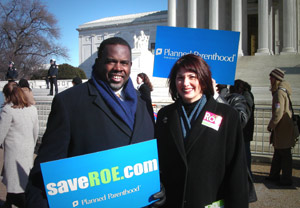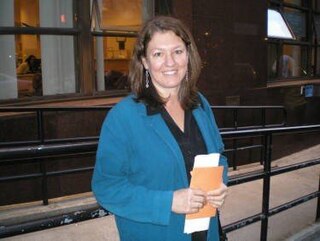Intact dilation and extraction is a surgical procedure that terminates and removes an intact fetus from the uterus. The procedure is used both after miscarriages and for abortions in the second and third trimesters of pregnancy.

The United States abortion-rights movement is a sociopolitical movement in the United States supporting the view that a woman should have the legal right to an elective abortion, meaning the right to terminate her pregnancy, and is part of a broader global abortion-rights movement. The movement consists of a variety of organizations, with no single centralized decision-making body.

Abortion in Canada is legal throughout pregnancy and is publicly funded as a medical procedure under the combined effects of the federal Canada Health Act and provincial health-care systems. However, access to services and resources varies by region. While some restrictions exist, Canada is one of the few nations with no criminal restrictions on abortion. Abortion is subject to provincial healthcare regulatory rules and guidelines for physicians. No provinces offer abortion on request at 24 weeks and beyond, although there are exceptions for certain medical complications.
The Planned Parenthood Federation of America, Inc. (PPFA), or simply Planned Parenthood, is a 501(c)(3) nonprofit organization that provides reproductive and sexual healthcare, and sexual education in the United States and globally. It is a member of the International Planned Parenthood Federation (IPPF).
The National Right to Life Committee (NRLC) is the oldest and largest national anti-abortion organization in the United States with affiliates in all 50 states and more than 3,000 local chapters nationwide.
The Religious Coalition for Reproductive Choice (RCRC) is an abortion rights organization founded in 1973 by clergy and lay leaders from mainline denominations and faith traditions to create an interfaith organization following Roe v. Wade, the 1973 U.S. Supreme Court decision legalizing abortion in the U.S. In 1993, the original name – the Religious Coalition for Abortion Rights (RCAR) – was changed to the Religious Coalition for Reproductive Choice.
Conscience clauses are legal clauses attached to laws in some parts of the United States and other countries which permit pharmacists, physicians, and/or other providers of health care not to provide certain medical services for reasons of religion or conscience. It can also involve parents withholding consenting for particular treatments for their children.
The Republican National Coalition for Life (RNCL), often stylized as RNC/Life, is an organization formed to maintain the commitment of the Republican Party of the United States to anti-abortion principles.

Primary care trusts (PCTs) were part of the National Health Service in England from 2001 to 2013. PCTs were largely administrative bodies, responsible for commissioning primary, community and secondary health services from providers. Until 31 May 2011, they also provided community health services directly. Collectively PCTs were responsible for spending around 80 per cent of the total NHS budget. Primary care trusts were abolished on 31 March 2013 as part of the Health and Social Care Act 2012, with their work taken over by clinical commissioning groups.
Ann Marie Furedi is the former chief executive of the British Pregnancy Advisory Service, the UK's largest independent abortion provider.
Global Action for Children (GAC) was a highly effective nonpartisan coalition dedicated to improving the lives of orphans and vulnerable children in the developing world active from 2004 - 2010.
Ronald J. "Ron" Fitzsimmons is the Executive Director of Alice's Kids, a 501(c)(3) non-profit charitable organization based in Alexandria, Virginia. Founded in 2011 by Ron and his sister, Alice's Kids provides immediate assistance to children identified by teachers, social workers, and others as urgently in need of clothes, school or athletic equipment, or other items their families or other charities are unable to provide.

Merle Hoffman is an American journalist and activist.
Thomas Glessner is an American lawyer and the president of the National Institute of Family and Life Advocates (NIFLA), a public interest law firm founded in 1993.
The Feminist Women's Health Center of Atlanta is a feminist health center that provides comprehensive gynecological health care, engages in community outreach, and advocates for reproductive justice. Kwajelyn Jackson has served as the executive director since 2018.

Linda Prine is a family physician, professor, and non-profit founder. She held many leadership positions in the New York State Academy of Family Physicians and was the Women’s Health Director at a large FQHC in New York. In 2000 she co-founded the Reproductive Health Access Project. She remains the fellowship director of the Reproductive Health Access Project fellowship, and residency teacher at the Harlem and Mount Sinai Downtown Family Medicine residencies. In 2019 she co-founded the Miscarriage and Abortion Hotline where she still volunteers.
The SisterSong Women of Color Reproductive Justice Collective, also known as SisterSong, is a national activist organization dedicated to reproductive justice for women of color.
Abortion in Maryland is legal at all stages of pregnancy. The first laws regulating abortion in the state were passed in 1867 and 1868, banning abortion except by a physician to "secure the safety of the mother." Abortion providers continued to operate both within and outside of the law. Legal enforcement became more strict from the 1940s through 60s, with numerous police raids on abortion providers. In 1968, Maryland passed a liberalized abortion law that clarified the wording of the previous law, allowing abortion in hospital settings in cases of rape, severe fetal deformity, or when life and health were endangered.




